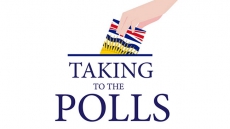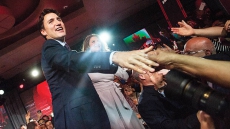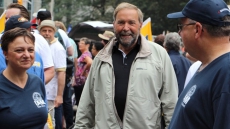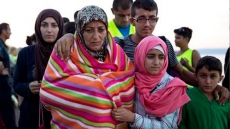British Columbia Premier Christy Clark recently announced the 2017 Budget. The fifth-consecutive balanced budget for the province includes $50.2 billion, a $295 million surplus, $400 million in tax cuts for people and $2.1 billion in new program spending. The province aims to spend a record $13.7 billion on capital investments in schools, roads, hospitals and public safety over the next three years. While the budget did include benefiting introductions and cuts for BC residents, a few questions and doubts were left unanswered. In the midst of preparing for the 2017 provincial election, Premier Clark sat down with DARPAN Magazine to answer some of these questions. In an exclusive interview, BC’s Premier shares her thoughts and plans on some of the pressing issues the province currently faces.

Below are excerpts from the interview:
What are you looking forward to in the 2017 provincial election?
I love campaigns because I get to meet people. Being Premier is an incredible privilege; I spend a lot of time at my desk working everyday. When I get into a campaign, I get a chance to talk to everybody everyday. We are number one in economic growth and job creation, so I think I have a good record to run on, so I am looking forward to that, and mostly the chance to reconnect with people.
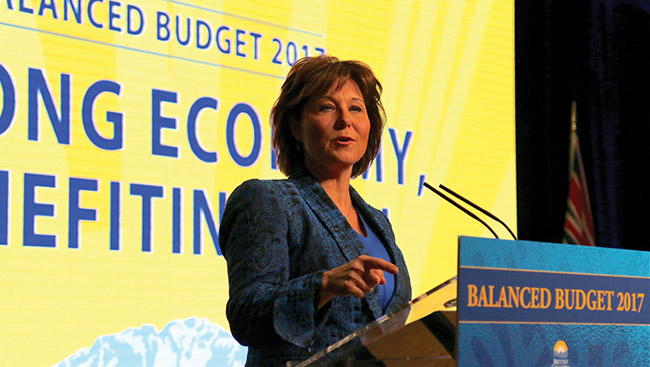
The 2017 British Columbia Budget was recently announced; what plan did you have in mind while working on it?
I ask people to think about their own household budget. How do you do that every month and make sure you have enough money for your mortgage, dinners and daycares? It’s really hard and everybody is never happy. It is just like that but with $51 billion. So this year, I said to our team, ‘It’s time we gave money back to people in tax cuts. A billion-dollar tax cuts.’ Most people’s Medical Services Plan (MSP) will be cut by half before we eliminate it all together and [there will be] new investments in health care and education. We need to invest on services on one side but we also need to put more money in people’s pockets because they can spend that money better than government can.

A lot of regulations have been made to deal with the housing affordability issue the region is facing. Do you think these introductions will stabilize BC’s housing market?
There were three things in the budget that were about housing affordability. The first one is the home program, giving first-time homebuyers an interest-free no-payment loan of upto $37,000 to get their down payment together. Second, 6,000 units of rental and affordable housing for people; and third an exemption on the home owner grant of upto $1.6 million. These three things are all trying to keep people in their homes, get people in their first home or make sure they can rent at an affordable rate. That’s in addition to the 15 per cent foreign tax, the luxury tax on homes of over $2 million, and the changes we have made to regulate realtors. So there is a long list of things.
But ultimately, the thing that will make the difference in making homes more affordable in addition to all this is cities’ need to approve more apartments and houses to be build. If there is more supply, it means the prices go down and every time we build a new house, it creates a lot of jobs for the people. We should be doing more building in BC but cities need to give approvals.

The province will spend $320 million over the next three years on interim funding for K-12 education. Which areas will this funding be dedicated to?
In Surrey, for example, we are opening 5,200 new student spaces. We have just added a 1,000 new teachers starting in January and we are going to be adding more. I think that education is the single most important investment that government makes and we need to invest more in teachers and support them more, and make sure that our kids have the best education. My dad was a teacher; teachers do a great job with our kids. I always remind people that many came to BC because they wanted to earn a good job, they wanted to own a home and they wanted a great education for their kids. So that’s an investment we are going to keep making.
Healthcare cost and accessibility is another problem that residents have to deal with. Despite various efforts taken to relieve the surgery back log, residents face long waiting times at hospitals. How do you plan on lessening them?
Healthcare needs to be there when you need it. We have added $4 billion to the healthcare budget; it is going to be an almost $20 million budget. Over the next few months, you are going to see our plan to invest that money in reducing waiting lists and increasing access to the healthcare system. There will be more news on some of the specifics on how we will spend that billion dollars coming soon. We are making investments all over the province’ so you will see some new hospitals and spaces opened up for people.
Fentanyl crisis is big at the moment with a lot of overdose deaths taking place the last few months. About 116 people died of an overdose last month. How are you fighting this crisis?
The first and most important thing is all of us as parents need to remind our kids how dangerous it is to do drugs. They think that [doing it] once won’t hurt them. With fentanyl out there, it can kill you on the first use. We have a big public education campaign underway to remind and make people know how dangerous street drugs can be these days. That’s one part of it.

We also know that people will still do drugs, so we need to be there to help save their lives. We have declared a public health emergency and have invested over $65 million in treatment and care. We are investing in 500 new detox beds for people. We lost over 900 people last year to fentanyl and opioid abuse; every single one of those deaths is preventable. We are throwing everything that we have got at it right now and we are going to keep adding to that until we get this epidemic beat. It’s so hard and scary for parents to know that our kids are out there and can run into these drugs.
The Trans Mountain Expansion Project is receiving opposition from some city councilors and BC residents for its lack of proper consultations and research. How do you justify these allegations?
It was Justin Trudeau’s government that approved it. They had the right to approve it and it was their job to do that. My job was to fight for everything that we could get to make sure that BC was safe if it happened. So we fought for, most importantly, a protection plan for our ocean. They put together a $1.5 billion new plan to protect our coast and that is really important – not just for Kinder Morgan but it is important for all the ships going up and down our coast all the time. We fought for the conditions, we stood up for them and we had got al the five conditions satisfied by the time they finally approved. I think we should be proud of that because British Columbians really got behind the five conditions, we fought hard and we succeeded.

BC’s unemployment is said to be the lowest among other provinces. How do you wish to maintain this ranking?
We need to say ‘yes’ to development, we need to say yes to projects like Site C which is going to be 10,000 jobs, many of them in Surrey and Vancouver. We need to say yes to Liquefied natural gas (LNG), that’s thousands of jobs. Every time we say yes to a development proposal, we create jobs. Our infrastructure plan is $24.5 billion over the next three years; that is going to create over 30,000 jobs for people. We are number one in the country on job growth; we have the lowest unemployment rate since 1961. But this isn’t going to get easier. Donald Trump in the US is not going to make it easier for Canadians to build jobs here as he wants all those jobs to be in America. We are going to fight really hard; we have got to work hard, negotiate tough in order to make sure we create those jobs here in BC. I think now is the time, with all this uncertainty, that BC really needs a fighter, someone who is going to go out and fight for BC and for our jobs.
Donald Trump’s presidency could affect trade relations between BC and the USA. What measures are you taking to ensure BC’s trade sector is not affected?
The big risk is softwood lumber first and foremost. Depending on the number of duties that the American government decides to put on, there could be a lot of jobs at risk there. BC is going to need a tough negotiator on wine, on softwood lumber, or our agricultural and manufactured exports to the United States. I am prepared to fight for British Columbians. We have got a new softwood envoy down in the United States, David Emerson (BC Trade envoy to the US) who will be working with the ambassador. I am in regular contact with the prime minister, ambassador, trade minister, special trade envoy and former Prime Minister Brian Mulroney. So we are going to make sure to work hard to get the right deal for BC workers. When you’re facing a tough negotiation, you have to be equally tough on the other side of the table.

Some call the 2017 provincial election as a ‘change’ election. Do you see that as a challenge? What response are you expecting from the voters?
I feel that every election is about change because everybody is always asking themselves what kind of change they want and that’s really what democracy is about. So when we get to the election campaign, what we will see is very stark contrast between my party and the NDP - because the NDP opposes every job creation project (Site C, Kinder Morgan, LNG, forestry jobs). We have been on the side of saying ‘yes’ to jobs – let’s do it responsibly and carefully but let’s say yes to creating jobs for people.
Do you want the kind of change that means higher unemployment, fewer jobs, lower wages, more taxes? Or you want the change that is going to be on the track that we are on right now? Our economy is number one in Canada, unemployment is lowest, 2,200 jobs created – most of any province in the country. That’s a pretty good track record and if people want that kind of change to continue, they should vote for that.

You have constantly received the support of the South Asian community in BC. What are your views and message to the community?
We are so blessed in BC to have so many people of South Asian descent who have chosen to make this their home, because I don’t think you can find a community that is more entrepreneurial, that has more get up and go, that is going to work harder. I don’t think you can find a community that brings more passion to community, and that’s really what makes Canada great – is that people all decide to chip in together. That’s how we build, that’s how we make a country. The South Asian community is so full of passion and heart, and entrepreneurialism. BC would not be the same place if so many Punjabis and South Asians had decided to go somewhere else. My message to the community is thank you to the contribution each and every one of you makes to our province everyday. We are really lucky that so many South Asian people chose BC as their home.
PHOTOS: BC Government, DARPAN Archives
